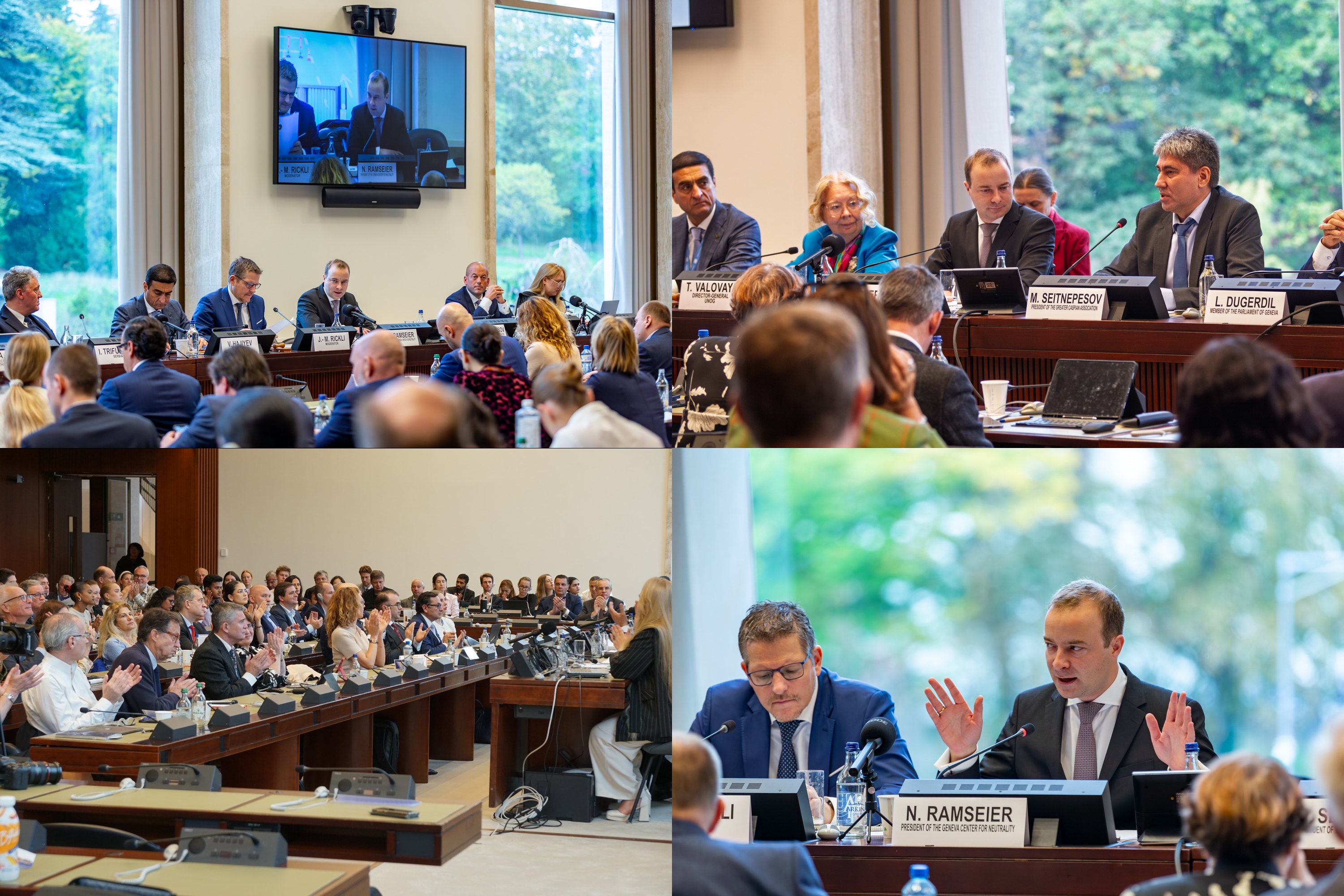
Leading diplomats, academics, and policymakers gathered to discuss the significance of neutrality in today’s conflict-ridden world at the international forum “War, Peace, and Neutrality” at the United Nations in Geneva on October 10. Initiated by the Geneva Center for Neutrality and organized together with the Permanent Mission of Turkmenistan at the UN and the Greater Caspian Association, the event underscored the challenges and opportunities of neutrality in modern diplomacy. At the first session “Neutrality in the modern world”, panellists highlighted the evolving role of neutral states today.
Neutrality as Active Responsibility – UN Geneva Director-General
Opening the conference, Tatiana Valovaya, Director-General of the United Nations Office at Geneva, stressed that neutrality must not be confused with passivity: “Neutrality is not indifference, nor does it mean inaction. In the United Nations, neutrality has a precise meaning. It requires humanitarian action, not taking sides in hostilities or engaging in controversies over political, racial, religious or ideological questions.” She reminded the audience that neutrality enables humanitarian access and mediation, noting that “in today’s world, where tensions are rising and divides are deepening, neutrality matters more than ever. It creates the space for diplomacy, peacebuilding, and preserving channels of communication.”
Valovaya also recalled UN General Assembly Resolution 71/275, which established 12 December as the International Day of Neutrality, initiated by Turkmenistan.
In the opening remarks, Murat Seitnepesov, President of the Greater Caspian Association reminded that only three countries in the world are officially recognized as neutral, which is Switzerland from Vienna Congress in 1815, Austria after World War II, and Turkmenistan from 1995. “This year, we will celebrate the anniversary of Turkmenistan neutrality, and that’s why our region is very much relevant to the Swiss neutrality, and to the topic of today’s forum”, - he added.
Perception, Trust, and Digital Neutrality – Geneva Center for Neutrality
Nicolas Ramseier, President and Co-founder of the Geneva Center for Neutrality, reflected on Switzerland’s evolving role and proposed that neutrality be redefined for the digital era.
“Neutrality can be seen as a building with three floors: the legal neutrality of the Hague Convention; the perception of neutrality, which is how other states view you; and finally, total detachment. For Switzerland, the real game is played on the second floor – perception and trust”, - Ramseier argued that trust, sovereignty, and independence are central to making neutrality credible, and warned that Switzerland’s image has suffered in recent years and for mediating in the conflicts effectively, Swiss must work on trust and perception.
He introduced the concept of digital neutrality, which Geneva Center for Neutrality is actively promoting, urging Switzerland to pioneer a global safe space for data storage: “Today there is a quasi-war between big tech players and states. Switzerland should create infrastructure where data can be stored under a ‘neutrality label,’ ensuring it is not weaponized in conflicts or manipulation. This would extend our neutrality into the digital age,”- Nicolas Ramseier said, believing Switzerland should be the world’s “Digitally Neutral” data haven.
Neutrality Is an Active Position of Creation – Turkmenistan Ambassador
Speaking for a country whose permanent neutrality was recognized by the UN in 1995, Vepa Hajiyev, Ambassador of Turkmenistan to the Swiss Confederation and Permanent Representative to UNOG, framed neutrality as actionable statecraft: “Neutrality remains one of the few instruments capable of sustaining dialogue, reducing tensions, and strengthening trust among states. Neutrality is an active position of creation, not a refusal to engage… Peace begins not with signed documents, but with the trust that states and people are capable of giving one another.”
Hajiyev spotlighted concrete proposals voiced by Turkmenistan’s president at the UN General Assembly: adding “Neutrality for Peace and Security” as a dedicated GA agenda item; tabling a resolution on “The Role and Significance of the Policy of Neutrality in Maintaining International Peace, Security, and Sustainable Development”, and many others.
Geneva, he said, is a “symbol of diplomacy and mediation,” the ideal setting to “discuss neutrality, peace, and humanitarian responsibility.” As for Turkmenistan, neutrality is neither “withdrawal, nor isolation” but “a policy of openness, engagement, and creation.”
Neutrality as Courage and Discretion – Swiss Political Perspective
Lionel Dugerdil, Geneva parliamentarian and candidate for the Geneva Council of State, emphasized the traditional Swiss model of quiet, discreet diplomacy. Citing the 1985 Reagan-Gorbachev summit in Geneva, he argued that Switzerland’s strength lies in humility and credibility: “Being neutral means sometimes remaining silent when you want to denounce. It means meeting with interlocutors the world condemns, because without them no solution is possible.”
He warned that Switzerland risks losing this credibility by mixing sanctions with mediation. For Dugerdil, neutrality demands courage: “In today’s polarized world, neutrality is not cowardice – it is courage. Our role is to defuse tensions, maintain dialogue, even if it is interpreted as cowardice or opportunism.”
Dugerdil’s prescription was crisp, that Swiss must diffuse tensions again and again by keeping dialogue open and treating all sides equally. That is what it means to remain neutral and is what a small country like Switzerland can best bring to the world.
Discipline and Flexibility for Mediation - Serbian Ambassador
Ambassador of the Republic of Serbia to Switzerland - Ivan Trifunović, offered a comparative lens on small-state strategy. Even “successful patterns are being tested” by great-power rivalry and the weaponization of supply chains and finance, small states, he argued, need “very few red lines”: territorial integrity, constitutional order, core treaty commitment, and maximum flexibility elsewhere. He sketched a pragmatic playbook: multiply functional channels and build a minimal national consensus that survives political turnover. For Switzerland, adopting legally compatible sanctions can be squared with neutrality “when clarified in law,” thus preserving identity and good offices. Ivan Trifunović emphasised that Belgrade sees scope to work with the OSCE, the only pan-European body with full membership across divides.
Neutrality as “Active Non-Belligerence” for a Post-Hegemonic World - Club of Rome
Secretary General of the Club of Rome - Carlos A. Pereira, reframed “neutrality for what?”, which lands on earth–humanity reconciliation: ending not only wars among states but the adversarial stance toward nature. Preparing for war, he warned, risks a “Greek tragedy” - a self-fulfilling prophecy born of fear - so the strategic alternative must be learning, collaboration, and what he called “active non-belligerence.”
Active non-belligerence, in Pereira framing, is neutrality with purpose: a deliberate choice by states to invest their diplomatic capital in cooperation mechanisms rather than coercive hierarchies. He argued that a post-hegemonic world is the natural ecosystem for modern neutrality. In such a system, neutral states don’t sit out; they set rules, steward trust, and convene plural pathways to solve cross-border risks - food security, climate, and the tech frontier. Switzerland, with Geneva’s multilateral hub, is well placed to translate neutrality into convening power: brokering standards, piloting confidence-building arrangements, rather than arms-race competition. Neutrality is seen by Pereira as a platform that absorbs polarization and releases practical cooperation.
The discussion was moderated by Jean-Marc Rickli, Head of Global and Emerging Risks at the Geneva Center for Security Policy, who concluded that neutrality is back at the center of European and global security debates, and it needs sharper definitions and modern applications.
The first session «Neutrality in the modern world” highlighted a consensus that neutrality is far from obsolete. Instead, it is evolving – from a legal principle to a moral and political stance, and potentially into new domains such as cyberspace and digital governance. Whether through humanitarian access, discreet diplomacy, or technological innovation, neutrality remains a proactive force for building bridges for peace.
The high-level forum “War, Peace, and Neutrality” at the UN in Geneva lasted all day, consisting of three sessions: "Neutrality in the modern world", "Neutrality, business, and strategic assets", and "Neutrality and AI: Security, innovation, governance". More than 300 diplomats, academics, politicians, experts, and civil society representatives participated in the event.
